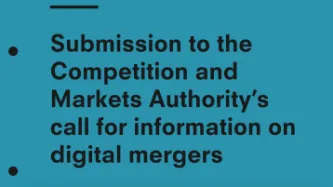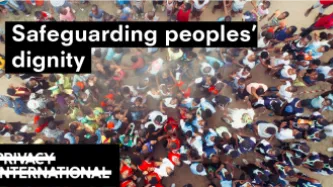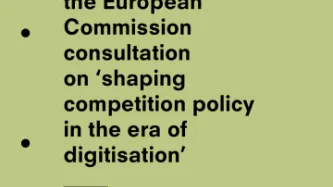Advanced Search
Content Type: Examples
In October 2018, the answers to a FOIA request filed by the Project on Government Oversight revealed that in June 2018 Amazon pitched its Rekognition facial recognition system to US Immigration and Customs Enforcement officials as a way to help them target or identify immigrants. Amazon has also marketed Rekognition to police departments, and it is used by officers in Oregon and Florida even though tests have raised questions about its accuracy. Hundreds of Amazon workers protested by writing a…
Content Type: Examples
In November 2018, tests began of the €4.5 million iBorderCtrl project, which saw AI-powered lie detectors installed at airports in Hungary, Latvia, and Greece to question passengers travelling from outside the EU. The AI questioner was set to ask each passenger to confirm their name, age, and date of birth, and then query them about the purpose of their trip and who is paying for it. If the AI believes the person is lying, it is designed to change its tone of voice to become "more skeptical"…
Content Type: Examples
In November 2018, 112 civil liberties, immigrant rights groups, child welfare advocates, and privacy activists wrote a letter to the heads of the US Department of Health and Human Services and the Department of Homeland Security demanding an immediate halt to the HHS Office for Refugee Resettlement's practice of using information given them by detained migrant children to arrest and deport their US-based relatives and other sponsors. The policy began in April 2018, and the result has been that…
Content Type: Examples
In November 2018 the UK's Equality and Human Rights Commission warned that asylum seekers have been deterred from seeking medical help in Scotland and Wales since the UK government began forcing the English NHS to charge upfront in 2017 and by fears that medical personnel will comply with Home Office orders to forward their data. The commission, along with health charities and the Labour and LibDem political parties, called for the policy to be suspended. The Home Office policy of moving asylum…
Content Type: Examples
The Home Office Christmas 2018 announcement of the post-Brexit registration scheme for EU citizens resident in the UK included the note that the data applicants supplied might be shared with other public and private organisations "in the UK and overseas". Basing the refusal on Section 31 of the Freedom of Information Act, the Home Office refused to answer The3Million's FOI request for the identity of those organisations. A clause in the Data Protection Act 2018 exempts the Home Office from…
Content Type: Examples
In October 2018, British home secretary Sajid Javid apologised to more than 400 migrants, who included Gurkha soldiers and Afghans who had worked for the British armed forces, who were forced to provide DNA samples when applying to live and work in the UK. DNA samples are sometimes provided by applicants to prove their relationship to someone already in the UK, but are not supposed to be mandatory. An internal review indicated that more people than the initially estimated 449 had received DNA…
Content Type: Examples
In December 2018, Florida citizen Peter Sean Brown filed a federal lawsuit against the Monroe County Sheriff's offices for arresting and detaining him for three weeks claiming he was an illegal alien from Jamaica. Even though Brown offered to show the sheriff his birth certificate and explained he had been wrongfully detained 20 years before and the jail's own records listed his birthplace as Philadelphia, PA, the sheriff relied on a form sent by Immigration and Customs Enforcement. Brown…
Content Type: Examples
In December 2018, in the wake of the Windrush scandal, the National Police Council, which represents police chiefs across England and Wales agreed to cease passing on to deportation authorities information about people suspected of being in the country illegally. The measures also ban officers from checking the police national computer solely to check on immigration status. Police said they believed that their too-close relationship with immigration authorities in aid of the government's "…
Content Type: Examples
In a report released in December 2018, the UK's National Audit Office examined the management of information and immigrant casework at the Home Office that led to the refusal of services, detention, and removal of Commonwealth citizens who came to the UK and were granted indefinite leave to remain between 1948 and 1973, the so-called "Windrush generation" but never given documentation to prove their status. The NAO concludes that the Home Office failed to adequately consider its duty of care in…
Content Type: Examples
In November 2018 reports emerged that immigrants heading north from Central America to the US border are more and more often ensuring they are accompanied by children because "family units" are known to be less likely to be deported, at least temporarily, and smugglers charge less than half as much when a minor is in the group because their risk is less. Some parents have given their children - sometimes for cash - to other adults such as a relative, godparent, or, sometimes, unrelated person.…
Content Type: News & Analysis
Privacy International has joined over 30 organisations working with migrants and refugees to write to the newly appointed British Home Secretary to raise a number of pressing issues, which require action if the immigration and asylum system is to regain the trust of the public.
The letter below was sent to the Home Secretary on Wednesday, 30 July 2019.
Find out more about PI’s work to demand a more humane approach to immigration based on the principles of fairness, accessibility, and respect…
Content Type: Advocacy
Today, we have responded to the UK Competition and Markets Authority’s online platforms and digital advertising market study
In the last year, Privacy International has conducted research into the ad tech and the data brokers industry exposing and complaining about their exploitation of personal data and the lack of transparency of their activities.
Based on our research and analysis of the current trends, Privacy International provided observations on the three broad potential sources of…
Content Type: Advocacy
Privacy International and Open Rights Group welcome the Competition and Market Authority (CMA)’s call for information on digital mergers. In this submission, the organisations provide their observations on some of the questions raised in this consultation, focussing on: the ways in which digital products or services are monetized though user data and advertising; questioning the assumption that users pay products or services with personal data; providing examples of…
Content Type: Long Read
By Valentina Pavel, PI Mozilla-Ford Fellow, 2018-2019
Our digital environment is changing, fast. Nobody knows exactly what it’ll look like in five to ten years’ time, but we know that how we produce and share our data will change where we end up. We have to decide how to protect, enhance, and preserve our rights in a world where technology is everywhere and data is generated by every action. Key battles will be fought over who can access our data and how they may use it. It’s time to take…
Content Type: Examples
In 2017, US Immigration & Customs Enforcement (ICE) announced that it would seek to use artificial intelligence to automatically evaluate the probability of a prospective immigrant “becoming a positively contributing member of society.” In a letter to acting Department of Homeland Security Secretary Elaine Duke, a group of 54 concerned computer scientists, engineers, mathematicians, and researchers objected to ICE’s proposal and demanded that ICE abandon this approach because it would be…
Content Type: Examples
US Immigrations & Customs Enforcement (ICE) used social media monitoring to track groups and people in New York City associated with public events opposing the Trump administration’s policies, including ones related to immigration and gun control. The investigative branch of ICE created and circulated a spreadsheet, entitled ‘Anti-Trump Protest Spreadsheet 07/31/2018,” that provided details of events planned between July 31, 2018, and August 17, 2018. The spreadsheet pulled data from…
Content Type: Examples
The US government created a database of more than 50 journalists and immigrant rights advocates, many of whom were American citizens, associated with the journey of migrants travelling from Central America to the Mexico-US border in late 2018. Officials from Customs and Border Protection (CBP), Immigration and Customs Enforcement (ICE), the US Border Patrol, Homeland Security Investigations, and the Federal Bureau of Investigation (FBI) had access to this database. This list allowed the…
Content Type: Examples
A private intelligence company, LookingGlass Cyber Solutions, used social media to monitor more than 600 “Family Separation Day Protests” held across the United States on June 30, 2018, to oppose the Trump administration’s policy family separation policy. The policy was part of a “zero tolerance” approach to deter asylum seekers from coming to the United States by separating children from their parents. After collecting information about these protests through Facebook, including the precise…
Content Type: Long Read
Whilst innovation in technology and data processing have provided individuals and communities with new opportunities to exercise their fundamental rights and freedoms, this has not come without risks, and these opportunities have not been enjoyed by all equally and freely.
Our relationships and interactions with governments and industry have become increasingly dependent on us providing more and more data and information about ourselves. And, it’s not only the information we provide knowingly…
Content Type: News & Analysis
Increasingly every interaction migrants have within the immigration enforcement framework requires the processing of their personal data. The use of this data and new technologies are today driving a revolution in immigration enforcement which risks undermining people's rights and requires urgent attention.
This is why Privacy International, and several migrant and digital rights organisation, joined a formal complaint filed by the Platform for International Cooperation on Undocumented…
Content Type: News & Analysis
US Immigration and Customs Enforcement (ICE), the agency at the centre of carrying out President Trump’s “zero tolerance” approach to immigration enforcement and family separation, has for years been contracting a US surveillance company to intercept peoples’ communications across the United States. The wide potential scope for the use of the powers raises concerns about their use for the real-time surveillance of people, families, and communities caught up in Trump’s immigration crackdown…
Content Type: News & Analysis
Protest movements throughout history have helped to shape the world we know today. From the suffragettes to the civil rights movement, and to contemporary movements such as those focusing on LGBTIQ+ rights, protests have become a vital way for many, who feel powerless otherwise, to have their voices heard.
But now, making the decision to attend a protest comes with consequences that you may very well be unaware of. This is because policing and security services, always hungry in their quest to…
Content Type: News & Analysis
According to the International Organization for Migration, an estimated 258 million people are international migrants – that is, someone who changes their country of usual residence, That’s one in every 30 people on earth.
These unprecedented movements levels show no sign of slowing down. It is predicted that by 2050, there will be 450 million migrants across the world.
Nowadays, it is politically acceptable to demonise migrants, and countless leaders have spewed divisive and xenophobic…
Content Type: Long Read
Cellebrite, a surveillance firm marketing itself as the “global leader in digital intelligence”, is marketing its digital extraction devices at a new target: authorities interrogating people seeking asylum.
Israel-based Cellebrite, a subsidiary of Japan’s Sun Corporation, markets forensic tools which empower authorities to bypass passwords on digital devices, allowing them to download, analyse, and visualise data.
Its products are in wide use across the world: a 2019 marketing…
Content Type: News & Analysis
We found this image here.
Today, a panel of competition experts, headed by Professor Jason Furman, the former chief economic adviser of in the Obama administration, confirmed that tech giants, like Facebook, Amazon, Google, Apple and Microsoft, do not face enough competition.
Significantly, the report finds that control over personal data by tech giants is one of the main causes preventing competition and ultimately innovation.
Privacy International's research has shown clear examples of…
Content Type: Long Read
As calls for a ‘secure southern border’ are amplified in the US by politicians and pundits, Silicon Valley techies are coming out in force to proffer swanky digital solutions in the place of 30-foot steel slats or concrete blocks.
One such company is Anduril Industries, named after a sword in Lord of the Rings, which represents a symbol of hidden power.
Over recent months, Anduril Industries frontman Palmer Luckey has been making the PR rounds to promote his company’s version of a border wall…
Content Type: News & Analysis
On 22 January 2019 Google updated its Terms of Service and Privacy Policy for Europe.
The message is quite reassuring:
“Nothing about your experience in Google services will change. And nothing is changing in terms of your privacy settings, the way your data is processed, nor the purposes of its processing”.
Then it says: “However, if you don’t want to accept these changes in our terms and Privacy Policy, you can choose to stop using the applicable services.”
Simple. If you don’t like it,…
Content Type: Examples
In September 2018 the UK's Information Commissioner found that it was likely that during 2017 a number of migrant rough sleepers were reported to the Home Office enforcement teams by the homelessness charity St. Mungo's. The finding followed a complaint from the Public Interest Law Unit. The charity claimed it passed on these details when people wanted to return home. The Home Office halted its policy of deporting migrant rough sleepers in December 2017 and the government was to pay hundreds of…
Content Type: Advocacy
Consumers benefit from the existence of competitive markets, in which they can freely choose among a wide range of products and services. Competition policy plays an important role in this regard by ensuring that competition is not disrupted in a way that can harm consumers directly (e.g. leading to price increases or less choice) or indirectly (e.g. weakening competition as a process by hampering the ability of firms to compete on the merits).
Content Type: Advocacy
Privacy International encourages the European Commission to consider ways to reform or at least re-interpret competition regulation to address the data protection implications and the broader societal challenges posed by the exploitation of data by big corporations. This includes, for example, systematic consideration of data protection issues (including though consultation with relevant data protection authorities and organisations protecting privacy and consumer rights) when assessing mergers…



















